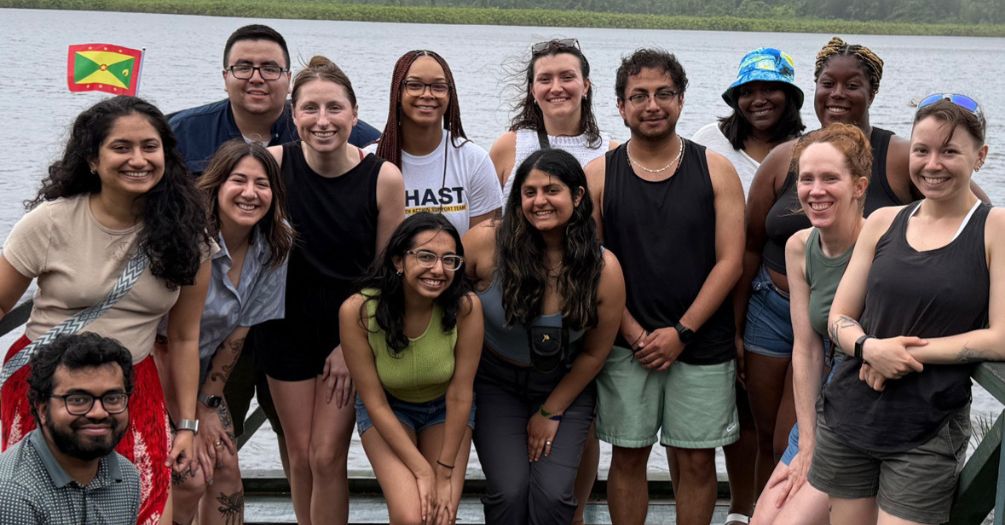Listening Deeply, Acting Locally: My Final Project Creating a Drug-Free Solutions in Grenada

Shravani Gummaraju
2nd year MPH Epidemiology Student
As our plane descended toward Grenada's green mountains, I couldn't help but reflect on how my public health journey had come full circle. From my earliest community work in India, to engaging Michigan residents, to training Community Health Workers in San Antonio, and now - as my final graduate school project - bringing all these experiences to the Caribbean. This Grenada trip would be the perfect end to my MPH education, a chance to apply everything I had learned before stepping into the professional world.
Our journey began with an island tour guided by Mr. Mandoo, whose detailed narratives connected colonial history to present-day challenges. This cultural immersion proved invaluable, providing context for the substance abuse issues we would explore. Walking through the market and stopping at a cascading waterfall, I gained immediate appreciation for Grenada's rich cultural fabric - one where “liming” (socializing) is central to community life, but increasingly intertwined with substance use among youth.
My most profound learning came from conducting focus groups across multiple schools. In meeting rooms with peeling paint and whirring fans, principals, counselors, and juvenile administrators shared candid insights about policy implementation gaps. “We've never actually seen the full policy document,” one principal admitted, highlighting a critical disconnect between policy creation and execution. These conversations reminded me of similar implementation challenges I'd witnessed working with community health workers in San Antonio, where great policies often failed due to communication barriers.
The most challenging and ultimately rewarding aspect was conducting community interviews in the sweltering heat. My heart raced during those first encounters with alcohol vendors, asking pointed questions about ID verification practices. Drawing on my previous experience engaging sensitive topics with communities in India, I quickly discovered the power of framing: “We're working with the Ministry of Education to reduce drugs among children. Your opinion matters and can be included in the policy!” This simple approach unlocked doors to surprisingly candid conversations. One vendor shared, “I know I should check IDs, but everybody knows everybody here, sometime parents send children to buy alcohol and it's hard to say no.”
This experience revealed the universal challenges in public health implementation across all four settings where I've worked. Despite geographical and cultural differences between India, Michigan communities, San Antonio's CHW networks, and Grenada, I observed common barriers: limited resources, policy-practice gaps, and the critical need for stakeholder buy-in. Yet each setting taught me unique approaches - India's grassroots mobilization, Michigan's data-driven campaigns, San Antonio's peer education model, and now Grenada's approach leveraging strong community networks and cultural traditions.
Most importantly, this final field experience solidified my understanding that effective public health interventions don't impose external solutions but rather identify and amplify existing community strengths. In Grenada, these strengths included tight-knit school communities, respected religious leaders, and cultural traditions that could be redirected toward healthier choices.
As I graduate, I couldn't have asked for a more perfect final project. This Grenada experience has woven together all the threads of my education—from theories learned in classrooms to practical skills gained across three countries and diverse communities. I'm struck by a simple truth: public health is fundamentally about listening. I've learned that sustainable solutions emerge from listening deeply, that culturally-appropriate materials outperform generalized approaches, and that sometimes the most valuable public health skill is simply creating space for communities to articulate their own solutions. The complete cycle: from community needs assessment to implementation of targeted interventions has prepared me for future challenges in ways coursework alone never could.
I return with not just new skills but a deeper commitment to community-centered public health practice. As one Grenadian principal told us, “We don't need outside experts to tell us what's wrong, we know it—we need partners to help us build what's right.” As I continue my public health journey, I carry this wisdom as both a responsibility and a privilege.
My MPH journey is complete, but the real work is just beginning.
